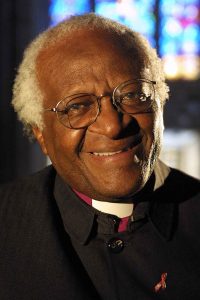 Christine M. Venter is a Teaching Professor at Notre Dame Law School and Affiliated Faculty in Gender Studies at the University of Notre Dame
Christine M. Venter is a Teaching Professor at Notre Dame Law School and Affiliated Faculty in Gender Studies at the University of Notre Dame
Nobel laureate, first black Anglican Archbishop, leader of South Africa’s Truth and Reconciliation Commission, prominent anti-apartheid activist, husband and father, Desmond Mpilo Tutu was all of those things and more, but to the people of South Africa he was simply “Arch” or “the Arch.” Looking back at his life and accomplishments, one might suppose that he was an unapproachable, iconic, historic figure but it was in his outsize sense of humor, humility, passion for justice, and affinity for those at the margins of society that people will remember him for.
Known for wearing a t-shirt that said “call me Arch” he never lost his commitment to ubuntu, the conviction that a person is a person because of and for other people. When Butler University and the Christian Theological Center in Indiana named a center after him, he modestly insisted that “naming a center after a person who is still alive can make it seem that an individual somehow on their own was able to accomplish what he accomplished. It was our people.”

After the apartheid system was defeated, Tutu turned his attention to other forms of injustice, the treatment of the Palestinians, environmental justice, the plight of the Syrian people, the suffering of those with AIDs, and discrimination against women and the LGBTQ community.
In his later years, he became a spokesperson for UNFE, a UN campaign aimed at promoting equal and fair treatment for LGBTQ+ individuals. When speaking about discrimination against the LGBTQ community, he proclaimed “I oppose such injustice with the same passion that I opposed apartheid.” He also campaigned for the ordination of women in the Anglican Church and praised Pope Francis for his commitment to environmental justice, as well as the fact that Francis chooses to live humbly, eschewing the Papal apartment.
Tutu also did not shrink from criticizing those in power, including some of his former anti-apartheid activist colleagues in the ANC government, whom he accused of “stopping the gravy train just long enough to get on.” Tutu once chastised then-President Thabo Mbeki for not doing enough to address AIDs and poverty, and later called on President Zuma to resign, after claims of corruption were raised against Zuma.
But ultimately Tutu will be remembered for his great devotion to the oppressed in society, whom he referred to as “the people left in the dust.” Many South Africans, myself included, recall watching the TRC hearings where he would openly weep for the victims of apartheid and their families. Tutu saw his calling as serving a God who has “a bias for the downtrodden.” As he put it, “we so desperately long for all of us to learn that we are meant for one another. We are meant for complementarity.” RIP Desmond Tutu, Arch,–you gave meaning to Phillip Larkin’s epithet “What will survive of us is love.”
